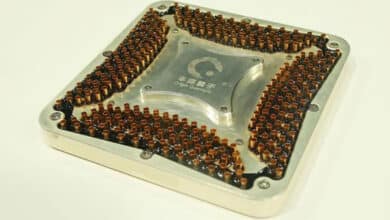EU Launches Plan for a Comprehensive “Quantum Act”

1 Nov 2025 – The European Union (EU) is laying the groundwork for a major legislative push in quantum technologies with a proposed EU Quantum Act, aiming to unify and amplify Europe’s efforts in the global quantum race. On October 31, the European Commission opened a public consultation (Call for Evidence) for stakeholders to help shape this Quantum Act, which is slated for adoption in 2026.
The envisioned Quantum Act has three primary objectives for this “critical and dual-use” technology area:
- Boost research and innovation – building on Europe’s strong scientific base in quantum. This likely means expanded funding for R&D programs, fostering collaboration across EU countries (addressing fragmentation), and supporting the education and training of quantum scientists and engineers.
- Scale up industrial capacity – moving from lab prototypes to mass production of quantum devices. The Act specifically mentions establishing pilot production lines and a chip design facility for quantum technologies. This is analogous to the EU Chips Act but for quantum: creating infrastructure where European companies can fabricate quantum processors, sensors, and communication hardware at scale. By doing so, the EU wants to incubate home-grown quantum startups and ensure a supply of critical components (like qubit chips, photonic circuits, cryogenic electronics) without relying on non-EU imports.
- Reinforce supply chain resilience and governance – ensuring Europe has control over key parts of the quantum value chain and setting up governance structures to coordinate efforts. Quantum tech is considered dual-use (civil and military applications), so supply chain security (avoiding single points of failure or dependence) is crucial. Governance could mean new EU-level bodies or public-private partnerships to steer quantum initiatives, as well as regulations or standards to guide development responsibly.
The Quantum Act will build on the EU’s existing Quantum Europe 2030 strategy and complement other flagship initiatives: the Chips Act (semiconductor manufacturing boost), EuroHPC (high-performance computing and supercomputers), and IRIS² (the EU’s planned secure satellite constellation for communications). By referencing these, the Commission signals quantum is part of a broader tech sovereignty drive – tying in with supercomputing (quantum accelerators for HPC), secure communications (quantum encryption via satellites, as IRIS² will likely incorporate quantum key distribution), and advanced computing supply chains.
The consultation invites a wide array of stakeholders: member state governments, EU agencies, operators of initiatives like EuroQCI (quantum communication infrastructure) and EuroHPC, industry players large and small, startups, academia, standardization bodies, as well as experts in cybersecurity, defense, etc. Essentially, anyone involved in Europe’s quantum ecosystem is asked to “Have Your Say” by November 26, 2025, to inform what the Act should prioritize and how it should be structured.
Why does this matter? Europe was early in funding quantum research (with its Quantum Flagship program launched in 2018), but translation into commercial success and scaling has been a concern. Efforts are somewhat fragmented across different countries (Germany has a large quantum computing program, France has its plan, etc.). An EU Quantum Act could streamline funding, reduce overlap, and pool resources for big-ticket items like fabs and testing facilities that single countries might struggle to justify alone. It also likely will address talent and brain drain – ensuring Europe trains, attracts, and retains quantum experts, rather than losing them to US or Chinese firms.
Another aspect is setting regulatory standards and ethical frameworks for quantum tech (governance). Europe tends to lead in tech regulation (see GDPR for data privacy, AI Act for artificial intelligence). A Quantum Act might establish things like security certification for quantum devices, export control measures for sensitive quantum tech, or protocols for integrating quantum-safe encryption in government communications.
In summary, the EU Quantum Act initiative is Europe saying: “We need a cohesive plan to stay at the forefront of quantum, just as we’re doing for chips. We won’t cede this key technology to others.” By aligning all 27 EU countries and leveraging the single market’s scale, the hope is to create a vibrant quantum industry in Europe that rivals that in the US and China. If adopted in 2026, the Act will likely bring significant investments (potentially billions of euros), new programs (perhaps a Joint Undertaking for Quantum like EuroHPC), and a long-term commitment through 2030 and beyond to quantum technologies as a pillar of Europe’s digital future. The consultation now is the first step in that legislative journey, gathering ideas so the Commission can draft a concrete proposal for the Act.
Quantum Upside & Quantum Risk - Handled
My company - Applied Quantum - helps governments, enterprises, and investors prepare for both the upside and the risk of quantum technologies. We deliver concise board and investor briefings; demystify quantum computing, sensing, and communications; craft national and corporate strategies to capture advantage; and turn plans into delivery. We help you mitigate the quantum risk by executing crypto‑inventory, crypto‑agility implementation, PQC migration, and broader defenses against the quantum threat. We run vendor due diligence, proof‑of‑value pilots, standards and policy alignment, workforce training, and procurement support, then oversee implementation across your organization. Contact me if you want help.



